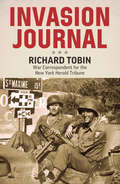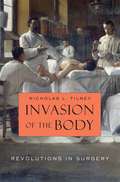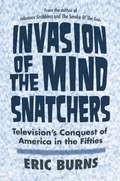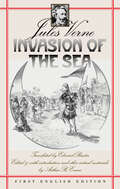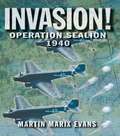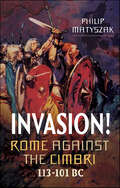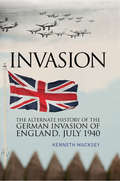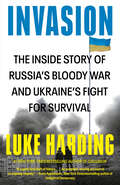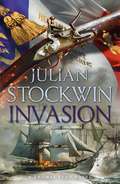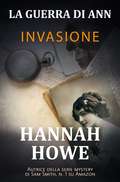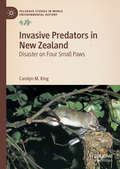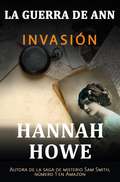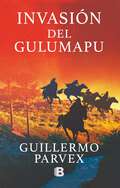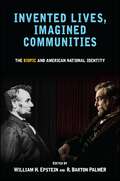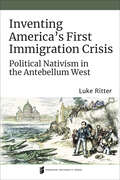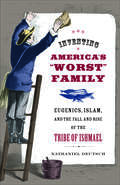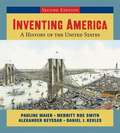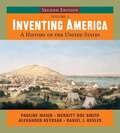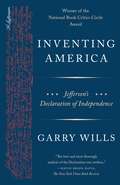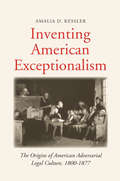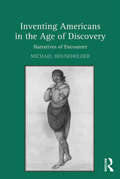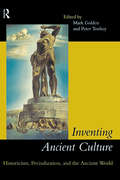- Table View
- List View
Invasion Journal
by Richard L. TobinInvasion Journal, first published in 1944, is veteran war correspondent Richard Tobin's account of his time in England, aboard several Royal Navy fighting ships, and in France with American G.I.s shortly after the D-Day invasion. Offering interesting insights into English life – the food, morale of the civilians, V-1 bombings – as well as a look at Allied soldiers from its leaders to its soldiers and sailors, Invasion Journal portrays war-time life as it was for millions of people during the heady year of 1944. Of note is his coverage of the broadcasts by the Nazis of the unsuccessful attempt on Hitler's life on July 20, 1944. Tobin (1910-1995) was a reporter, editor, and war correspondent for The New York Herald Tribune from 1932-1956. From 1960-1976 he worked at The Saturday Review as a senior editor and executive.
Invasion of the Body: Revolutions in Surgery
by Nicholas L. TilneyIn 1913, the Peter Bent Brigham Hospital in Boston admitted its first patient, Mary Agnes Turner, who suffered from varicose veins in her legs. The surgical treatment she received, under ether anesthesia, was the most advanced available at the time. At the same hospital fifty years later, Nicholas Tilney—then a second-year resident—assisted in the repair of a large aortic aneurysm. The cutting-edge diagnostic tools he used to evaluate the patient’s condition would soon be eclipsed by yet more sophisticated apparatus, including minimally invasive approaches and state-of-the-art imaging technology, which Tilney would draw on in pioneering organ transplant surgery and becoming one of its most distinguished practitioners. In Invasion of the Body, Tilney tells the story of modern surgery and the revolutions that have transformed the field: anesthesia, prevention of infection, professional standards of competency, pharmaceutical advances, and the present turmoil in medical education and health care reform. Tilney uses as his stage the famous Boston teaching hospital where he completed his residency and went on to practice (now called Brigham and Women's). His cast of characters includes clinicians, support staff, trainees, patients, families, and various applied scientists who push the revolutions forward. While lauding the innovations that have brought surgeons' capabilities to heights undreamed of even a few decades ago, Tilney also previews a challenging future, as new capacities to prolong life and restore health run headlong into unsustainable costs. The authoritative voice he brings to the ancient tradition of surgical invasion will be welcomed by patients, practitioners, and policymakers alike.
Invasion of the Mind Snatchers: Television's Conquest of America in the Fifties
by Eric BurnsWhen the first television was demonstrated in 1927, a headline in The New York Timesread, “Like a Photo Come to Life. ” It was a momentous occasion. But the power of television wasn’t fully harnessed until the 1950s, when the medium was, as Eric Burns says, “At its most preoccupying, its most life-altering. ” And Burns, a former NBC News correspondent who is an Emmy-winner for his broadcast writing,knows about the impact of television. Invasion of the Mind Snatcherschronicles the influence of television that was watched daily by the baby boomer generation. As kids became spellbound by Howdy Doodyand The Ed Sullivan Show,Burns reveals, they often acted out their favorite programs. Likewise, they purchased the merchandise being promoted by performers, and became fascinated by the personalities they saw on screen, often emulating their behavior. It was the first generation raised by TV and Burns looks at both the promise of broadcasting as espoused by the inventors, and how that promise was both redefined and lost by the corporations who helped to spread the technology. Yet Burns also contextualizes the social, cultural, and political events that helped shape the Fifties-from Sputnik and the Rosenberg trial to Senator Joseph McCarthy’s Red Scare. In doing so, he charts the effect of television on politics, religion, race, and sex, and how the medium provided a persuasive message to the young, impressionable viewers.
Invasion of the Sea (Early Classics of Science Fiction)
by Jules VerneFirst English edition of a classic Verne novel. Jules Verne, celebrated French author of Twenty Thousand Leagues Under the Sea and Around the World in 80 Days, wrote over 60 novels collected in the popular series "Voyages Extraordinaires." A handful of these have never been translated into English, including Invasion of the Sea, written in 1904 when large-scale canal digging was very much a part of the political, economic, and military strategy of the world's imperial powers. Instead of linking two seas, as existing canals (the Suez and the Panama) did, Verne proposed a canal that would create a sea in the heart of the Sahara Desert. The story raises a host of concerns — environmental, cultural, and political. The proposed sea threatens the nomadic way of life of those Islamic tribes living on the site, and they declare war. The ensuing struggle is finally resolved only by a cataclysmic natural event. This Wesleyan edition features notes, appendices and an introduction by Verne scholar Arthur B. Evans, as well as reproductions of the illustrations from the original French edition.
Invasion!: Operation Sea Lion, 1940
by Martin Marix Evans Angus McgeochThis terrifying alternative reality is actually based on historical facts. The book follows the real course of events up to1 September, including the planning in Britain and Germany, and the aerial war. The fictional story then supposes that the Germans halted their advance in France along the Seine and the Aisne after the fall of Paris and that Marshal Petain conceded an armistice at that point. The Panzer divisions are thus able to rest and re-equip in northern France…A brilliant blend of meticulous research and imagination, this book is bound to appeal to anyone with an interest in the causes and effects of historical events, and indeed to anyone interested in world war history itself.
Invasion!: Rome Against the Cimbri, 113–101 BC
by Philip MatyszakPartly as a result of poor commanders and partly because the Romans had an innate and misguided belief in the invincibility of their legions, the first battles against the Cimbri were a series of disasters. These culminated in the Battle of Arausio in 105 BC when two Roman armies were utterly destroyed. Rome finally realized that their republic faced an existential threat, and made the necessary painful political and military changes that were needed to face that threat. Rome also found a commander who could take on the Cimbri. Caius Marius was a deeply flawed man – scheming, cautious to the point of cowardice, and quick to claim credit for the achievements of others. Nevertheless, he was a massive improvement on the leaders who had preceded him. The reshaped Roman army eventually worked out how to weather the savage onrush of the initial barbarian assault. Thereafter, the grim discipline of the legions was enough to wear down the opposition. It helped that Marius never fought unless the situation favored him, and as a result his army gradually became accustomed to victory. Had the Cimbri overwhelmed Rome, as at one time it seemed inevitable that they would, then European history would have been very different.
Invasion: The Alternative History of the German Invasion of England, July 1940 (Greenhill Military Paperback Ser.)
by Kenneth MackseyThe WWII historian&’s bracingly accurate analysis of what might have happened if Hitler ordered Operation Sea Lion to breech the shores of England. In June 1940, German troops gathered just across the English Channel, poised for the invasion of Britain. With France defeated and Britain cowed, Hitler seemed ready for his greatest gamble. In this compelling alternative history, the Germans launch the invasion that, in reality, was never more than a plan. Landing between Dover and Hythe, German troops push inland supported by the Luftwaffe and the impregnable panzers, and strike out towards London. The British, desperate to defeat the invaders, rally and prepare for a crucial confrontation at Maidstone. Realistic, carefully researched and superbly written, Invasion is a classic of alternate history and a thought-provoking look at how Britain&’s war might have been.&“Macksey&’s blend of what actually happened and what might have been makes for a piece of writing comparable to Frederick Forsyth at his best.&” —Jack Higgins&“Convincingly described and excellently illustrated.&” —The Daily Telegraph, UK
Invasion: The Inside Story of Russia's Bloody War and Ukraine's Fight for Survival
by Luke HardingNew York Times bestselling author of Collusion and The Snowden Files Luke Harding&’s personal, frontline reporting on Russia&’s harrowing invasion of Ukraine, the biggest news event of the year and an inflection point in international politics&“An excellent, moving account of an ongoing tragedy.&” —Anne Applebaum, New York Times bestselling author of Twilight of DemocracyIn a damning, inspiring, and breathtaking narrative of what is likely to be a turning point for Europe—and the world—Guardian correspondent and New York Times bestselling author Luke Harding reports firsthand on the Russian invasion of Ukraine. When, just before dawn on February 24, 2022, Vladimir Putin launched a series of brutal attacks, Harding was there, on the ground in Kyiv. But this senseless violence was met with astounding resilience—from, among others, the country&’s embattled president, Volodymyr Zelenskiy—and the courage of a people preparedi to risk everything to preserve their nation&’s freedom. Here are piercing portraits of the leaders on both sides of this monumental struggle, a haunting depiction of the atrocities in Bucha and elsewhere, and an intimate glimpse into the ordinary lives being impacted by the biggest conflict in Europe since the Second World War. Harding captures this crucial moment in history with candor, insight, and an unwavering focus on the human stories that lie at its heart.
Invasion: Thomas Kydd 10
by Julian Stockwin'Paints a vivid picture of life aboard the mighty ship-of-the-line' - Daily ExpressNapoleon's forces are poised to invade Britain, and Commander Thomas Kydd's ship is at the forefront of the fleet defending the English coast. His honour restored after temporary disgrace in the Channel Islands, and reunited with his ship Teazer, Kydd seizes the chance to fight for his country. Then Kydd is abruptly withdrawn from the fleet and sent back to Dover on a secret mission to guard a mysterious American inventor. Having worked his way up from press-ganged seaman to captain of his own ship, Kydd is furious to find he will miss his opportunity to prove himself in battle. And Kydd's baffled superiors are equally angry to lose Kydd and his ship at such a dangerous time. Yet Kydd's role in the approaching war may be the most crucial part he has ever played.*********************What readers are saying about INVASION'Excellent in all respects' - 5 stars'Very compelling reading!' - 5 stars'I read ALL of the books by Julian Stockwin, he is an amazing author' - 5 stars'Yet another top-notch tale from the grand master of the age of fighting sail' - 5 stars'Julian Stockwin knows his craft . . . I lose myself in his books' - 5 stars
Invasion: Thomas Kydd 10
by Julian Stockwin'Paints a vivid picture of life aboard the mighty ship-of-the-line' - Daily ExpressNapoleon's forces are poised to invade Britain, and Commander Thomas Kydd's ship is at the forefront of the fleet defending the English coast. His honour restored after temporary disgrace in the Channel Islands, and reunited with his ship Teazer, Kydd seizes the chance to fight for his country. Then Kydd is abruptly withdrawn from the fleet and sent back to Dover on a secret mission to guard a mysterious American inventor. Having worked his way up from press-ganged seaman to captain of his own ship, Kydd is furious to find he will miss his opportunity to prove himself in battle. And Kydd's baffled superiors are equally angry to lose Kydd and his ship at such a dangerous time. Yet Kydd's role in the approaching war may be the most crucial part he has ever played.*********************What readers are saying about INVASION'Excellent in all respects' - 5 stars'Very compelling reading!' - 5 stars'I read ALL of the books by Julian Stockwin, he is an amazing author' - 5 stars'Yet another top-notch tale from the grand master of the age of fighting sail' - 5 stars'Julian Stockwin knows his craft . . . I lose myself in his books' - 5 stars
Invasione
by Maria Cristina Martinelli Hannah HoweMentre suo marito Emrys viene ancora dato per disperso in azione, Ann Morgan riceve un’offerta personale dall’affabile Ispettore Max Deveraux. Dovrebbe declinare o accettare la sua offerta? Invece, nella sua vita professionale, Ann si trova davanti a un dilemma. Dopo l’omicidio di Trevor Bowman, dovrebbe rilevare la sua agenzia investigativa? Proprio quando Ann sta riflettendo sugli aspetti personali e professionali della propria vita, un’amica le chiede di cercare sua figlia che è scomparsa. All’apparenza, Adeline Hopkins, la figlia, sta soffrendo per la relazione conflittuale che ha con il proprio padre. Però, che dire del suo ex-fidanzato e di un soldato americano, un Marine che ha frequentato brevemente? Con i soldati che si preparano per partire ed imbarcarsi per la seconda ondata del D-Day, Ann ha bisogno di risposte e finisce invece per trovarsi di nuovo di fronte a un altro quesito, il dilemma su come fare giustizia al meglio.
Invasive Predators in New Zealand: Disaster on Four Small Paws (Palgrave Studies in World Environmental History)
by Carolyn M. KingThe story of invasive species in New Zealand is unlike any other in the world. By the mid-thirteenth century, the main islands of the country were the last large landmasses on Earth to remain uninhabited by humans, or any other land mammals. New Zealand’s endemic fauna evolved in isolation until first Polynesians, and then Europeans, arrived with a host of companion animals such as rats and cats in tow. Well-equipped with teeth and claws, these small furry mammals, along with the later arrival of stoats and ferrets, have devastated the fragile populations of unique birds, lizards and insects. Carolyn M. King brings together the necessary historical analysis and recent ecological research to understand this long, slow tragedy. As a comprehensive historical perspective on the fate of an iconic endemic fauna, this book offers much-needed insight into one of New Zealand’s longest-running national crises.
Invasión
by Hannah HoweLa saga de misterio La Guerra de Ann es una saga de cinco novelas ambientadas en los años 1944/1945. Las historias son Betrayal, Invasion, Blackmail, Escape y Victory (títulos originales), cada una con aproximadamente 15 000 palabras. Estas se desarrollan cada cuatro meses y se publicarán cada cuatro meses, de forma que se puedan leer en tiempo real. Sin embargo, es posible que prefiera leerlas todas a la vez después de que se publique Victory. Es cuestión de gustos. Cabe mencionar que, en cada libro, hay un misterio que queda resuelto y que la historia de Ann alcanzará su conclusión tras la última publicación. Invasión Aún con su marido desaparecido, Ann Morgan recibe una oferta personal del apuesto detective Max Deveraux. ¿Debería declinarla o aceptarla? Mientras tanto, su vida profesional se ve afectada por un dilema: tras el asesinato de Trevor Bowman, ¿debería tomar las riendas de su agencia de investigación? Mientras Ann sopesa todos los aspectos de su vida personal y profesional, una amiga le pide que busque a su hija desaparecida. Parece que Adeline Hopkins, la hija, mantiene una mala relación con su padre. Sin embargo, ¿qué tienen que ver su exnovio y un soldado estadounidense con el que la joven estuvo saliendo brevemente? Mientras el ejército estadounidense se prepara para marcharse rumbo a la segunda ola de desembarcos, Ann necesita respuestas, las cuales la llevarán hasta un segundo dilema: ¿cuál es la mejor manera de impartir justicia?
Invasión del Gulumapu
by Guillermo ParvexContinuación de la novela en la que el periodista y escritor de no ficción se adentra en el imaginario mapuche a través del peñi Pedro Bórquez. Pedro Bórquez ha armado familia y una vida en el Gulumapu. Con esposa, hijos y buen vivir, el chileno que se adentró en tierras mapuche luego del terremoto que dejó Concepción en el suelo es el brazo derecho del lonko Mañilwenu, y junto a él consultará el cherrufe, la piedra mágica que le permite avizorar el futuro de su pueblo y el peligro que esas tierras corren por la amenaza de los chilenos. Segunda entrega de la exitosa ficción sobre el mundo mapuche que Guillermo Parvex inició con Frontera Sur y que, como lo hizo también en la ficción, cuenta con una fundamentación histórica que hace de esta novela un fiel retrato de los hechos que constituyeron a Chile como nación mestiza.
Inveighing We Will Go
by William F. Buckley Jr.Another collection of writing from William F. Buckley Jr., discussing such varied issues as the economy, religion, politics, education and communication.
Invented Lives, Imagined Communities: The Biopic and American National Identity (SUNY series, Horizons of Cinema)
by William H. Epstein; R. Barton PalmerBiopics—films that chronicle the lives of famous and notorious figures from our national history—have long been one of Hollywood's most popular and important genres, offering viewers various understandings of American national identity. Invented Lives, Imagined Communities provides the first full-length examination of US biopics, focusing on key releases in American cinema while treating recent developments in three fields: cinema studies, particularly the history of Hollywood; national identity studies dealing with the American experience; and scholarship devoted to modernity and postmodernity. Films discussed include Houdini, Patton, The Great White Hope, Bound for Glory, Ed Wood, Basquiat, Pollock, Sylvia, Kinsey, Fur, Milk, J. Edgar, and Lincoln, and the book pays special attention to the crucial generic plot along which biopics traverse and showcase American lives, even as they modify the various notions of the national character.
Invented by Law: Alexander Graham Bell and the Patent That Changed America
by Christopher BeauchampChristopher Beauchamp debunks the myth of Alexander Graham Bell as the telephone's sole inventor, exposing that story's origins in the arguments advanced by Bell's lawyers during fiercely contested battles for patent monopoly. The courts anointed Bell father of the telephone--likely the most consequential intellectual property right ever granted.
Inventing America's First Immigration Crisis: Political Nativism in the Antebellum West (Catholic Practice in North America)
by Luke RitterWhy have Americans expressed concern about immigration at some times but not at others? In pursuit of an answer, this book examines America’s first nativist movement, which responded to the rapid influx of 4.2 million immigrants between 1840 and 1860 and culminated in the dramatic rise of the National American Party. As previous studies have focused on the coasts, historians have not yet completely explained why westerners joined the ranks of the National American, or “Know Nothing,” Party or why the nation’s bloodiest anti-immigrant riots erupted in western cities—namely Chicago, Cincinnati, Louisville, and St. Louis. In focusing on the antebellum West, Inventing America’s First Immigration Crisis illuminates the cultural, economic, and political issues that originally motivated American nativism and explains how it ultimately shaped the political relationship between church and state.In six detailed chapters, Ritter explains how unprecedented immigration from Europe and rapid westward expansion reignited fears of Catholicism as a corrosive force. He presents new research on the inner sanctums of the secretive Order of Know-Nothings and provides original data on immigration, crime, and poverty in the urban West. Ritter argues that the country’s first bout of political nativism actually renewed Americans’ commitment to church-state separation. Native-born Americans compelled Catholics and immigrants, who might have otherwise shared an affinity for monarchism, to accept American-style democracy. Catholics and immigrants forced Americans to adopt a more inclusive definition of religious freedom. This study offers valuable insight into the history of nativism in U.S. politics and sheds light on present-day concerns about immigration, particularly the role of anti-Islamic appeals in recent elections.
Inventing America's Worst Family: Eugenics, Islam, and the Fall and Rise of the Tribe of Ishmael
by Nathaniel DeutschThis book tells the stranger-than-fiction story of how a poor white family from Indiana was scapegoated into prominence as America's "worst" family by the eugenics movement in the early twentieth century, then "reinvented" in the 1970s as part of a vanguard of social rebellion. In what becomes a profoundly unsettling counter-history of the United States, Nathaniel Deutsch traces how the Ishmaels, whose patriarch fought in the Revolutionary War, were discovered in the slums of Indianapolis in the 1870s and became a symbol for all that was wrong with the urban poor. The Ishmaels, actually white Christians, were later celebrated in the 1970s as the founders of the country's first African American Muslim community. This bizarre and fascinating saga reveals how class, race, religion, and science have shaped the nation's history and myths.
Inventing America: A History of the United States
by Pauline Maier Merritt Roe Smith Alexander Keyssar Daniel J. KevlesW. W. Norton presents Inventing America, a balanced new survey of American history by four outstanding historians. The text uses the theme of innovation—the impulse in American history to "make it new"—to integrate the political, economic, social, and cultural dimensions of the American story. From the creation of a new nation and the invention of the corporation in the eighteenth century, through the vast changes wrought by early industry and the rise of cities in the nineteenth century, to the culture of jazz and the new nation-state of the twentieth century, the text draws together the many ways in which innovation—and its limits—have marked American history.
Inventing America: A History of the United States, Volume 1 (2nd Edition)
by Pauline Maier Merritt Roe Smith Alexander Keyssar Daniel J. KevlesA textbook that includes study plans, outline quizzes, research projects and progress reports
Inventing America: Jefferson's Declaration of Independence
by Garry WillsFrom one of America's foremost historians, Inventing America compares Thomas Jefferson's original draft of the Declaration of Independence with the final, accepted version, thereby challenging many long-cherished assumptions about both the man and the document. Although Jefferson has long been idealized as a champion of individual rights, Wills argues that in fact his vision was one in which interdependence, not self-interest, lay at the foundation of society. "No one has offered so drastic a revision or so close or convincing an analysis as Wills has . . . The results are little short of astonishing" —(Edmund S. Morgan, New York Review of Books)
Inventing American Exceptionalism: The Origins of American Adversarial Legal Culture, 1800-1877
by Amalia D. KesslerA highly engaging account of the developments--not only legal, but also socioeconomic, political, and cultural--that gave rise to Americans' distinctively lawyer-driven legal culture When Americans imagine their legal system, it is the adversarial trial--dominated by dueling larger-than-life lawyers undertaking grand public performances--that first comes to mind. But as award-winning author Amalia Kessler reveals in this engrossing history, it was only in the turbulent decades before the Civil War that adversarialism became a defining American practice and ideology, displacing alternative, more judge-driven approaches to procedure. By drawing on a broad range of methods and sources--and by recovering neglected influences (including from Europe)--the author shows how the emergence of the American adversarial legal culture was a product not only of developments internal to law, but also of wider socioeconomic, political, and cultural debates over whether and how to undertake market regulation and pursue racial equality. As a result, adversarialism came to play a key role in defining American legal institutions and practices, as well as national identity.
Inventing Americans in the Age of Discovery: Narratives of Encounter
by Michael HouseholderInventing Americans in the Age of Discovery traces the linguistic, rhetorical, and literary innovations that emerged out of the first encounters between Europeans and indigenous peoples of the Americas. Through analysis of six texts, Michael Householder demonstrates the role of language in forming the identities or characters that permitted Europeans (English speakers, primarily) to adapt to the unusual circumstances of encounter. Arranged chronologically, the texts examined include John Mandeville's Travels, Richard Eden's English-language translations of the accounts of Spanish and Portuguese discovery and conquest, George Best's account of Martin Frobisher's voyages to northern Canada, Ralph Lane's account of the abandonment of Roanoke, John Smith's writings about Virginia, and John Underhill's account of the Pequot War. Through his analysis, Householder reveals that English colonists did not share a universal, homogenous view of indigenous Americans as savages, but that the writers, confronted by unfamiliar peoples and situations, resorted to a mixed array of cultural beliefs, myths, and theories to put together workable explanations of their experiences, which then became the basis for how Europeans in the colonies began transforming themselves into Americans.
Inventing Ancient Culture: Historicism, periodization and the ancient world
by Golden Mark Toohey PeterInventing Ancient Culture discusses aspects of antiquity which we have tended to ignore. It asks the reader how far we have reinvented antiquity, by applying modern concepts and understandings to its study. Furthermore, it challenges the common notion that perceptions of the self, of modern societal and institutional structures, originated in the Enlightenment. Rather, the authors and contributors argue, there are many continuities and marked similarities between the classical and the modern world. Mark Golden and Peter Toohey have assembled a lively cast of contributors who analyse and argue about classical culture, its understandings of philosophy, friendship, the human body, sexuality and historiography
